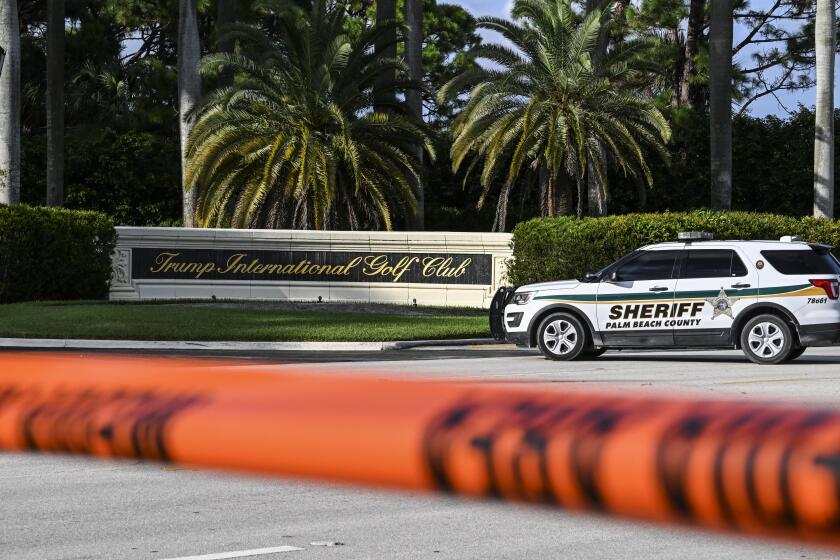Former head of Egyptian intelligence
Omar Suleiman, Egypt’s former spymaster and a confidant of deposed leader Hosni Mubarak, died Thursday in a U.S. hospital, months after his unsuccessful presidential bid to restore the old guard to power after a national revolution, state media reported. He was 76.
There were conflicting reports about the cause of death. The Egyptian Embassy in Washington said Suleiman died of a blood illness, according to the Ahram Online news website. The state news agency MENA reported that he died of a heart attack while undergoing tests in a Cleveland hospital. He had suffered from heart and lung ailments.
Suleiman epitomized the police state that repressed Egypt for three decades. He was a Washington ally on countering terrorism and a key negotiator with Palestinians and Israelis. Hastily named vice president in the final days of Mubarak’s rule, Suleiman was overwhelmed, failing to grasp the ideals of the uprising that ultimately led the military to seize power in February 2011.
He disappeared from public view for months, resurfacing as a presidential candidate in a race that was polarized by Islamists and remnants of the Mubarak regime. His candidacy ended in April, however, when the election commission ruled that he lacked enough authorized signatures on his registration form.
Much of his campaign centered on warning that Islamists wanted to turn Egypt into a religious state. Mohamed Morsi, a candidate for the Muslim Brotherhood, was elected president in June.
A well-tailored spy, who was credited with saving Mubarak’s life in a 1995 assassination attempt in Ethiopia, Suleiman had been criticized by rights groups for allowing his vast intelligence network to torture suspected Islamic militants. Nicknamed the “black box” by the Egyptian media, Suleiman had close relations with the CIA, especially after the Sept. 11, 2001, attacks.
“When called upon by other nations to assist in intelligence operations, Suleiman’s Mukhabarat [intelligence agency] has shown itself willing to take into custody and interrogate Egyptian and non-Egyptian persons, and those interrogations have included torture,” John Sifton, a former Human Rights Watch researcher who specialized in rendition and detention issues involving Egypt, told The Times last year.
“He is directly implicated [in torture], both as a member of the regime and ... he headed the Mukhabarat.”
Suleiman was born in 1936 in the poor Upper Egypt town of Qena. He attended a military academy and distinguished himself in the Arab-Israeli wars in 1967 and 1973. He was named military intelligence chief in 1991, when Egypt cooperated with U.S. forces to expel Saddam Hussein’s army from Kuwait. He became Egypt’s security chief in 1993 and was indispensable to Mubarak, who shared his disdain for Islamists and trusted him with Palestinian-Israeli negotiations and other sensitive diplomacy.
Meticulous and calculating -- he urged Mubarak to ride in a bulletproof limousine the day would-be assassins ambushed their entourage -- Suleiman was often mentioned as a possible successor to his boss. His supporters regarded him as an urbane tactician who could navigate the nation’s dominant forces: the Muslim Brotherhood and a cadre of secular generals appointed by Mubarak.
But talk of his political ascendancy faded in later years when Mubarak’s son, Gamal, now on trial for financial corruption, was frequently named as the heir apparent. Some analysts suggest that Suleiman, despite his years in the military, may have become estranged from the armed forces and its top commander, Field Marshal Mohamed Hussein Tantawi.
“Suleiman was always a bridge between the military wing of the regime and the civil wing. He was the military man who was most accepted among the civil elite,” said Ziad Akl, a senior analyst at Al Ahram Center for Strategic and Political Studies in Cairo. But, at some point during the 18 days of the revolution, there was a point of conflict between Suleiman and Tantawi, and the dominance of the military eventually prevailed.
“The acceptance of Suleiman as president was very far-fetched for the military,” Akl said. “The military may have felt that Suleiman would betray them in a sense for Gamal Mubarak’s business cronies.”
In his brief tenure as Mubarak’s only vice president, Suleiman often appeared uncomfortable, a spy forced into the limelight of a revolution he couldn’t stop. He called protesters agents of foreign governments and rejected calls for a transparent democracy. Pale and shaken, he stood before a microphone on Feb. 11, 2011, and announced that Mubarak had stepped down.
He offered to become acting president but was rebuffed, and the military took control. Egypt’s interim government on Thursday called him a “patriotic, honest figure.”
The question now “is will President Morsi attend his funeral?” said Akl. “Protocol says he should. On one hand, he can’t ignore this protocol as president, but he will have a backlash from the Brotherhood and revolution because Suleiman was openly against the revolution.”
Suleiman’s survivors include his wife and three daughters.
--
Special correspondent Reem Abdellatif contributed to this report.
More to Read
Sign up for Essential California
The most important California stories and recommendations in your inbox every morning.
You may occasionally receive promotional content from the Los Angeles Times.











